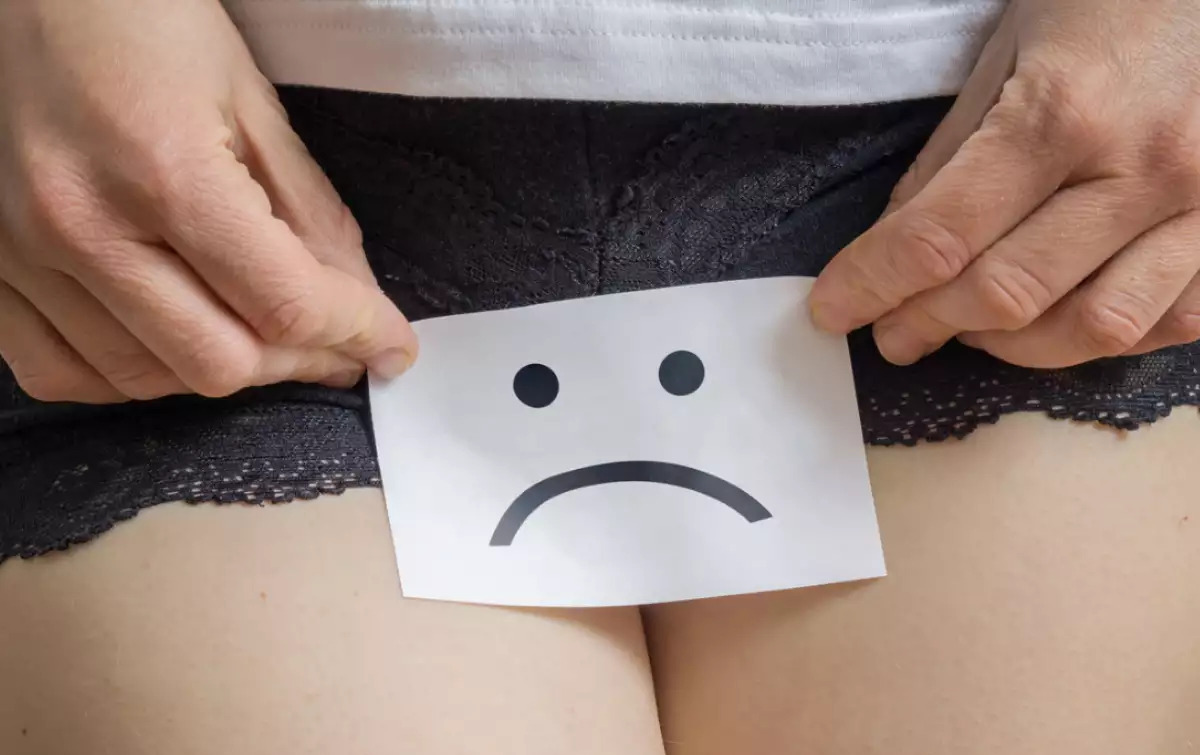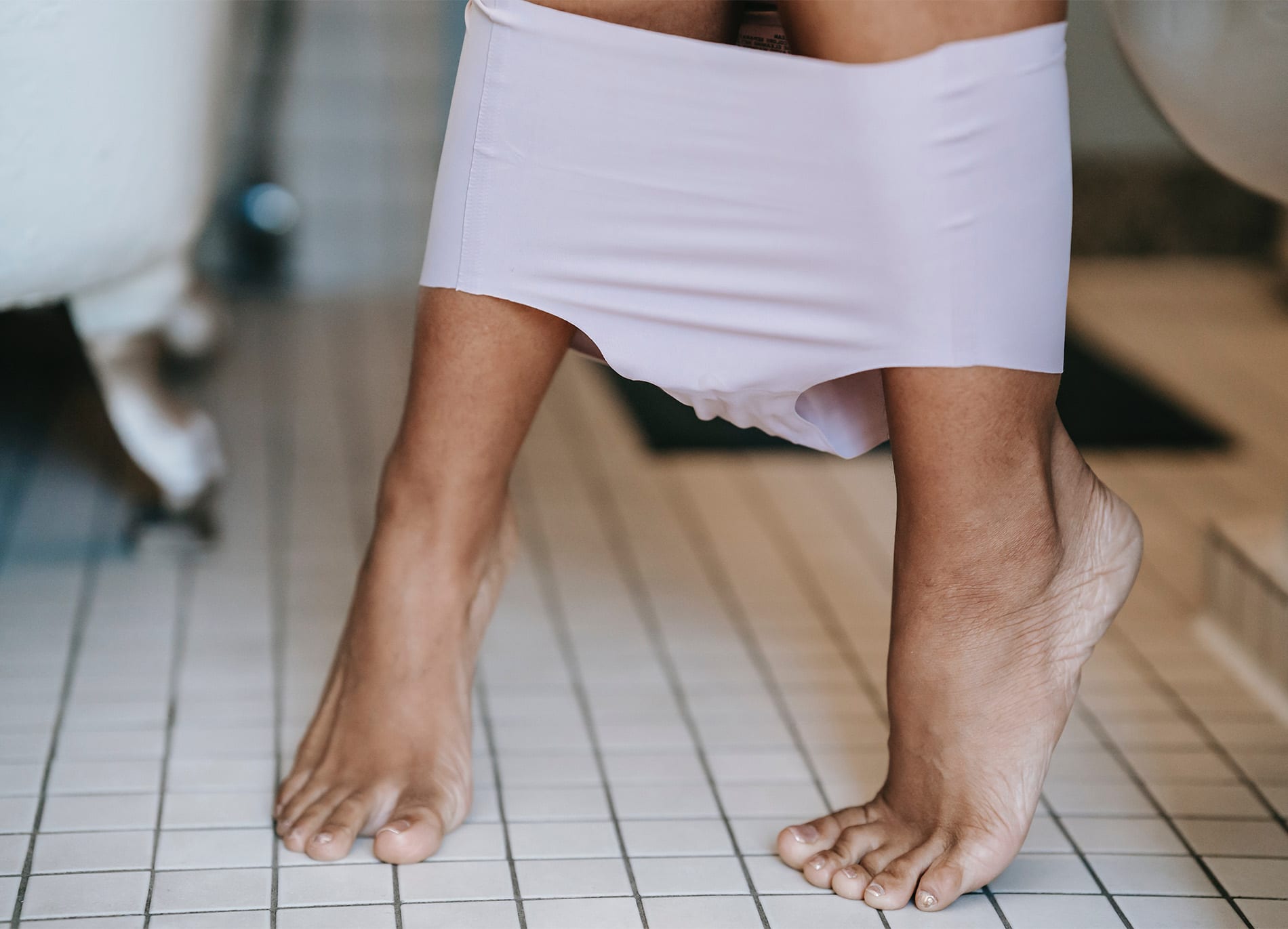

FAQs
Why Do My Panties Stink
Published: July 31, 2023
Find answers to common general questions about why your panties may be smelling bad. Learn tips and tricks to keep your panties fresh and odor-free.
(Many of the links in this article redirect to a specific reviewed product. Your purchase of these products through affiliate links helps to generate commission for Under-tec.com, at no extra cost. Learn more)
Table of Contents
- Introduction
- Common Causes of Stinky Panties
- Factors That Contribute to Bacterial Growth
- Types of Bacteria Commonly Found in Underwear
- Tips for Preventing and Managing Panty Odor
- Hygiene Practices for Maintaining Fresh-Smelling Panties
- Natural Remedies for Combating Panty Odor
- When to Seek Medical Advice for Persistent Panty Odor
- Conclusion
Introduction
Have you ever noticed a foul odor emanating from your panties? It can be an embarrassing and frustrating problem that many women experience. But why do your panties stink? The answer lies in a combination of factors that contribute to bacterial growth and the accumulation of unpleasant odors.
It’s important to note that panty odor is a common issue and not necessarily a reflection of poor hygiene. Even women who follow strict cleanliness routines can still be plagued by this problem. Understanding the common causes and taking preventive measures can help keep your panties smelling fresh and clean.
In this article, we will explore the various factors that contribute to stinky panties, the types of bacteria commonly found in underwear, and provide useful tips to prevent and manage panty odor. We will also discuss hygiene practices and natural remedies to combat the problem. However, if the issue persists despite your efforts, it is crucial to seek medical advice.
So, if you’re tired of dealing with unpleasant panty odors and want to regain your confidence, let’s dive into the world of stinky panties and find effective solutions to keep your underwear smelling fresh.
Common Causes of Stinky Panties
There are several common causes that can lead to unpleasant odors in your panties. Understanding these factors can help you identify the root cause and take appropriate measures to prevent and manage panty odor.
- Perspiration: Sweat is a natural bodily function, but when it gets trapped in your underwear, it can create a breeding ground for bacteria. This can result in foul-smelling odors. If you engage in physical activities or live in a hot and humid climate, excessive perspiration can exacerbate the problem.
- Vaginal Discharge: Vaginal discharge is a normal occurrence that helps to maintain the health of your vagina. However, when it mixes with bacteria and sweat, it can create an unpleasant odor. Changes in hormonal levels, menstrual cycle, or certain infections can increase the amount of vaginal discharge, leading to stronger odors.
- Improper Fabric Choices: The type of fabric your panties are made from can also contribute to panty odor. Synthetic materials, such as polyester and nylon, are less breathable compared to natural fibers like cotton. This can trap moisture and heat, creating an environment where bacteria thrive. Opting for underwear made from breathable materials can help reduce odor buildup.
- Poor Hygiene Habits: Inadequate personal hygiene practices can contribute to panty odor. Failing to wash your underwear frequently, not properly drying them after washing, or re-wearing dirty panties can allow bacteria to multiply and cause foul odors. It’s essential to prioritize cleanliness and hygiene when it comes to your underwear.
- Yeast Infections or Bacterial Vaginosis: Certain vaginal infections like yeast infections or bacterial vaginosis can result in strong odors. These infections disrupt the natural balance of vaginal flora, allowing harmful bacteria to multiply. If you experience persistent or unusual odors alongside other symptoms like itching, burning, or abnormal discharge, it is important to consult a healthcare professional.
By understanding the common causes of stinky panties, you can take proactive steps to address the issue. In the next section, we will delve into the factors that contribute to bacterial growth and further exacerbate panty odor.
Factors That Contribute to Bacterial Growth
Bacterial growth plays a significant role in causing panty odor. Understanding the factors that contribute to this growth can help you take preventive measures to keep your panties smelling fresh.
- Warm and Moist Environment: Bacteria thrive in warm and moist environments, which is why your panties can become a breeding ground for these microorganisms. When your underwear absorbs sweat and vaginal discharge, it provides the ideal conditions for bacteria to multiply rapidly.
- Tight-Fitting Clothing: Wearing tight-fitting clothing, such as skinny jeans or leggings, can create friction and trap moisture in the intimate area. This can lead to increased sweating and provide a conducive environment for bacterial growth. Opting for looser-fitting garments can help promote better air circulation and reduce the risk of panty odor.
- Improper Drying: Properly drying your underwear after washing is crucial in preventing bacterial growth. Leaving them damp or storing them in a humid environment can create the perfect breeding ground for bacteria. Ensure that your panties are thoroughly dried before wearing them again.
- Chemical Irritants: Some laundry detergents, fabric softeners, and feminine hygiene products contain harsh chemicals that can irritate your delicate skin and disrupt the natural pH balance of your vagina. This can lead to an overgrowth of bacteria and result in panty odor. Opt for gentle, fragrance-free products that are specifically formulated for intimate hygiene to minimize the risk of irritation.
- Infrequent Changing of Panties: Wearing the same pair of panties for an extended period can lead to bacterial overgrowth and persistent odor. It’s important to change your underwear daily, especially after exercising or sweating excessively. Fresh panties will help to maintain cleanliness and reduce the risk of bacterial buildup.
By understanding the factors that contribute to bacterial growth, you can take proactive measures to create an environment that is less conducive for microbial multiplication. In the next section, we will explore the types of bacteria commonly found in underwear and their role in causing panty odor.
Types of Bacteria Commonly Found in Underwear
Your underwear can harbor various types of bacteria, and their presence is a significant contributor to panty odor. Understanding the different bacteria that commonly reside in your underwear can help you take appropriate measures to combat the problem.
1. Escherichia coli (E. coli): E. coli is a type of bacteria that naturally occurs in the intestinal tract. However, when it migrates to the genital area, it can cause infection and give rise to unpleasant odors.
2. Staphylococcus aureus: Staphylococcus aureus is a common bacteria found on the skin and in the genital area. While it is typically harmless, it can cause infections if it enters the body through cuts or openings in the skin. It can also contribute to the development of unpleasant smells in your underwear.
3. Streptococcus: Streptococcus bacteria are commonly found in the throat and can sometimes migrate to the vaginal area. When they proliferate, they can lead to bacterial vaginosis, a condition characterized by foul-smelling discharge and panty odor.
4. Candida albicans: Candida albicans is a fungus that naturally occurs in the vaginal area. However, an overgrowth of this fungus can lead to a yeast infection, resulting in itching, burning, and a distinct odor in your panties.
5. Corynebacterium: Corynebacterium species are commonly found on the skin and can also be present in the genital area. While they are usually harmless, they can contribute to the development of panty odor when they multiply excessively.
These are just a few examples of the bacteria commonly found in underwear. It’s important to note that the presence of these bacteria is normal, but an overgrowth can cause issues such as infections or unpleasant odors. In the next section, we will provide tips for preventing and managing panty odor to help you maintain fresh-smelling panties.
Tips for Preventing and Managing Panty Odor
Dealing with panty odor can be a frustrating experience, but there are numerous preventive measures and management strategies you can employ to keep your underwear smelling fresh. Here are some effective tips to help you combat panty odor:
- Choose Breathable Fabrics: Opt for underwear made from breathable fabrics like cotton. Natural fibers allow for better air circulation, reducing the risk of sweat and moisture accumulation.
- Frequent Changing of Panties: Change your underwear daily, especially after exercising or sweating excessively. Fresh, clean underwear helps maintain hygiene and prevents bacterial buildup.
- Wash with Mild Detergents: Use gentle, fragrance-free detergents to wash your panties. Harsh chemicals and fragrances can irritate the delicate skin in the genital area and disrupt the natural pH balance, leading to bacterial overgrowth and odors.
- Proper Drying: Ensure that your panties are thoroughly dried before wearing them. Damp panties provide a favorable environment for bacteria to grow and multiply.
- Avoid Tight-Fitting Clothing: Opt for looser-fitting garments to allow for better air circulation. Tight clothing can trap moisture and heat, providing an ideal environment for bacteria.
- Practice Good Personal Hygiene: Follow proper personal hygiene practices, including washing the genital area with gentle soap and lukewarm water. Avoid using harsh soaps or douches, as they can disrupt the natural pH balance.
- Avoid Moisture-Trapping Products: Steer clear of products such as panty liners and synthetic underwear that can trap moisture and contribute to bacterial growth.
- Consider Panty Liners: If you experience heavy vaginal discharge, using panty liners can help absorb the moisture and minimize contact between the discharge and your underwear.
- Avoid Synthetic Fabrics: Synthetic fabrics like polyester and nylon are less breathable and can trap moisture, promoting bacterial growth. Opt for natural, breathable fabrics instead.
- Avoid Overwashing: While cleanliness is crucial, overwashing can strip the natural protective barrier of your skin. Stick to washing your panties after each use and avoid excessive scrubbing or using harsh chemicals.
By incorporating these tips into your daily routine, you can effectively prevent and manage panty odor, ensuring that your underwear remains fresh and odor-free. In the next section, we will explore additional hygiene practices that can help maintain a pleasant scent in your panties.
Hygiene Practices for Maintaining Fresh-Smelling Panties
In addition to the tips mentioned earlier, adopting proper hygiene practices is essential for keeping your panties smelling fresh. Here are some hygiene practices you can incorporate into your routine to maintain a pleasant scent in your underwear:
- Wash Regularly: Make it a habit to wash your panties after each use. Use lukewarm water and a mild, fragrance-free soap to gently cleanse the fabric. Avoid using harsh soaps or bleach, as they can be irritating to sensitive skin.
- Use Intimate Wash: Consider using a pH-balanced intimate wash specifically formulated for the genital area. These washes are designed to cleanse without disrupting the natural pH balance, helping to prevent odor-causing bacteria.
- Avoid Fabric Softeners: Fabric softeners may leave a residue on your underwear that can trap odors. Skip using fabric softeners when washing your panties to help maintain their freshness.
- Air Dry: Whenever possible, hang your panties to dry in a well-ventilated area. The fresh air and sunlight can help kill bacteria and keep your underwear smelling clean.
- Separate Clean and Dirty Laundry: Avoid mixing your clean underwear with dirty clothes. Keep a separate laundry bag or basket specifically for dirty underwear to prevent the spread of bacteria.
- Avoid Using Scented Products: While scented products may provide a temporary pleasant smell, they can also cause irritation and disrupt the natural balance of your delicate skin. Stick to fragrance-free or hypoallergenic products to minimize the risk of irritation.
- Practice Proper Wiping Technique: When using the toilet, remember to wipe from front to back. This helps prevent the transfer of bacteria from the rectal area to the vaginal area, reducing the risk of infections and odors.
- Change After Swimming: If you’ve been swimming or in a wet environment, change out of your wet bathing suit or damp underwear as soon as possible. Moisture can promote bacterial growth, leading to unpleasant odors.
- Regularly Trim Pubic Hair: Maintaining proper pubic hair hygiene can help prevent moisture entrapment and reduce the risk of bacterial growth. Regularly trim or groom your pubic hair to promote better airflow and hygiene.
- Pay Attention to Diet: Your diet can also influence body odor. Avoid excessive consumption of foods like garlic, onions, and spicy foods, as they can contribute to stronger body odors, including panty odor.
By incorporating these hygiene practices into your routine, you can effectively maintain fresh-smelling panties and prevent the buildup of odor-causing bacteria. In the next section, we will explore natural remedies that can help combat panty odor.
Natural Remedies for Combating Panty Odor
If you prefer natural alternatives, there are several remedies you can try to combat panty odor. While these remedies may not completely eliminate the problem, they can help reduce odor-causing bacteria and provide a fresher scent. Here are some natural remedies to consider:
- Apple Cider Vinegar: Dilute apple cider vinegar with water and use it as a rinse for your panties. Apple cider vinegar has antimicrobial properties that can help kill odor-causing bacteria.
- Tea Tree Oil: Add a few drops of tea tree oil to water and use it to rinse your panties. Tea tree oil has antibacterial properties that can help eliminate bacteria and minimize odor.
- Lemon Juice: Mix lemon juice with water and use it as a natural rinse for your underwear. Lemon juice has natural antibacterial properties and a fresh scent that can help combat panty odor.
- Baking Soda: Sprinkle a small amount of baking soda on your panties before wearing them. Baking soda helps absorb moisture and neutralize odors.
- Probiotics: Incorporate probiotic-rich foods like yogurt into your diet. Probiotics promote a healthy balance of bacteria in your body, including the genital area, minimizing the risk of unpleasant odors.
- Avoid Tightly Restrictive Underwear: Opt for underwear styles that allow for better air circulation. Loose-fitting panties made from breathable materials can help prevent the buildup of moisture and reduce the risk of panty odor.
- Herbal Remedies: Certain herbs like rosemary, lavender, and peppermint have natural antibacterial properties and a pleasant aroma. You can add these herbs to your laundry or make a herbal sachet to place in your drawers to keep your panties smelling fresh.
- Personal Care Routine: Follow a consistent personal care routine that includes showering regularly, thoroughly drying your genital area, and changing into clean underwear. Good personal hygiene practices can go a long way in reducing the risk of panty odor.
- Avoid Tight Clothing: Restrictive clothing can trap moisture and heat, creating an environment where bacteria thrive. Opt for loose-fitting garments made from natural fibers to promote better airflow and minimize the risk of panty odor.
- Stay Hydrated: Drinking an adequate amount of water can help maintain overall body hygiene, including the fresh scent of your panties. Staying properly hydrated helps flush out toxins and reduces the chances of unpleasant odors.
Remember, natural remedies may work differently for each individual, and it’s important to listen to your body. If you experience any irritation or discomfort, discontinue use and consult a healthcare professional. In the next section, we will discuss when to seek medical advice for persistent panty odor.
When to Seek Medical Advice for Persistent Panty Odor
While occasional panty odor can be managed through proper hygiene and preventive measures, persistent panty odor that does not improve despite your efforts may require medical attention. Here are some signs and situations that indicate it’s time to seek medical advice:
- Unusual or Strong Odor: If you notice a persistent, strong, or unusual odor in your panties that is not relieved by regular hygiene practices, it could be a sign of an underlying issue that needs medical attention.
- Accompanying Symptoms: If you experience additional symptoms like itching, burning, redness, or abnormal discharge along with the panty odor, it may indicate an infection or other health condition that requires medical evaluation.
- Recurrent Infections: If you frequently develop vaginal yeast infections or bacterial vaginosis, it’s important to consult a healthcare professional. Recurrent infections may be a sign of an underlying issue that needs to be addressed.
- Changes in Menstrual Cycle: If your panty odor coincides with changes in your menstrual cycle, such as a change in odor during or after menstruation, it’s worth discussing with a healthcare provider as it may indicate an imbalance or infection.
- Persistent Discomfort: If you experience persistent discomfort, pain, or irritation in the genital area, it’s important to seek medical advice. These symptoms may be indicative of an infection or other underlying condition.
- Previous Unsuccessful Remedies: If you have tried various hygiene practices, natural remedies, and preventive measures without alleviating the panty odor, it’s advisable to consult a healthcare professional for further evaluation and guidance.
- Unexplained Changes in Panty Odor: If you notice sudden and unexplained changes in the odor of your panties, it’s best to consult a healthcare professional. It can be an indication of an underlying health issue that needs to be diagnosed and treated.
Remember, healthcare professionals are trained to diagnose and treat conditions related to intimate health. If you have concerns about persistent panty odor, it’s always recommended to seek medical advice to ensure appropriate care and treatment. In the concluding section, we will summarize the key points discussed in this article.
Conclusion
Panty odor can be a common and frustrating problem for many women, but it is important to remember that it can be managed and prevented with the right strategies. By understanding the common causes of stinky panties, such as perspiration, vaginal discharge, improper fabric choices, poor hygiene habits, and certain infections, you can take proactive steps to address the issue.
Factors like warm and moist environments, tight-fitting clothing, improper drying, chemical irritants, and infrequent changing of panties can contribute to bacterial growth and exacerbate panty odor. By being aware of these factors, you can make changes to your daily routine and habits to keep your panties smelling fresh.
In addition to adopting proper hygiene practices, including regular washing with mild detergents, proper drying, and separating clean and dirty laundry, there are several natural remedies you can try to combat panty odor. Using apple cider vinegar, tea tree oil, lemon juice, baking soda, probiotics, and herbal remedies can help reduce odor-causing bacteria and provide a fresher scent.
However, if you experience persistent panty odor that does not improve with these preventive measures and remedies, it is essential to seek medical advice. Unusual or strong odors, accompanying symptoms, recurrent infections, changes in the menstrual cycle, persistent discomfort, previous unsuccessful remedies, and unexplained changes in panty odor should prompt a visit to a healthcare professional for further evaluation and guidance.
Remember, maintaining fresh-smelling panties is not just about hygiene; it’s about understanding your body, taking care of yourself, and seeking appropriate help if needed. By implementing the tips and strategies discussed in this article, you can confidently tackle panty odor and enjoy the comfort and freshness you deserve.










